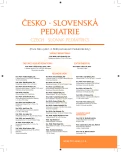-
Medical journals
- Career
Gastrointestinal adverse effects of methotrexate in patients with juvenile idiopathic arthritis – are they properly assessed?
Authors: P. Mrážik; V. Vargová
Authors‘ workplace: Klinika detí a dorastu LF UPJŠ a DFN, Košice, prednostka doc. MUDr. I. Schusterová, PhD.
Published in: Čes-slov Pediat 2015; 70 (4): 215-219.
Category: Original Papers
Overview
Aim:
The term juvenile idiopathic arthritis encompasses all forms of arthritis that appeared before 16 years of age, remain at least six weeks and their etiology is unknown. For patients with juvenile idiopathic arthritis methotrexate therapy is generally considered to be an effective, safe and well tolerated.Methods:
We assessed the prevalence of methotrexate gastrointestinal adverse effects in a group of 88 patients with juvenile idiopathic arthritis at rheumatology outpatient clinic of Children's Faculty Hospital in Košice, Slovakia. Gastrointestinal adverse effects were evaluated according to their intensity and duration (mild, moderate, severe) and on the basis of a causal relationship (possible, probable, definite).Results:
The methotrexate gastrointestinal adverse effects were found in 20 (22.7 %) of 88 patients, in the total number 21. The causal relationship to methotrexate treatment was „definite“ in 90 %. The most common symptoms were mild.Conclusion:
Gastrointestinal adverse effects due to methotrexate treatment may lead to non-adherence or refusal of treatment by relevant group of pediatric patients or their parents. The use of a standardized questionnaire could help to clarify the prevalence of patients with methotrexate intolerance in routine outpatient practice and the proper interpretation of difficulties. Thus allows early intervention prior to the loss of trust between patient and physician.Key words:
juvenile idiopathic arthritis, methotrexate, adverse effects, intolerance
Sources
1. Ravelli A, Martini A. Juvenile idiopathic arthritis. Lancet 2007; 9563 : 767–778.
2. Ambulantná starostlivosť o deti a dorast v SR 2012. Bratislava: Národné centrum zdravotníckych informácií, 2013 : 1–35.
3. Zdravotnícka ročenka Slovenskej republiky 2012. Bratislava: Národné centrum zdravotníckych informácií, 2014 : 1–256.
4. Petty RE, Southwood TR, Manners P, et al. International league of Associations for Rheumatology classification of juvenile idiopathic arthritis: 2nd revision, Edmonton: 2001. J Rheumatol 2004; 2 : 390–-392.
5. Beukelman T, Patkar NM, Saag KG, et al. American College of Rheumatology recommendations for the treatment of juvenile idiopathic arthritis: initiation and safety monitoring of therapeutic agents for the treatment of arthritis and systemic features. Arthritis Care & Research 2011; 4 : 465–482.
6. Giannini EH, Brewer EJ, Kuzmina N, et al. Methotrexate in resistant juvenile rheumatoid arthritis. Results of the U.S.A. – U.S.S.R. double-blind, placebo-controlled trial. N Engl J Med 1992; 16 : 1043–1049.
7. Ravelli A, Martini A. Methotrexate in juvenile idiopathic arthritis: answers and questions. J Rheumatol 2000; 8 : 1830–1833.
8. Ruperto N, Murray KJ, Gerloni V, et al. A randomized trial of parenteral methotrexate comparing an intermediate dose with a higher dose in children with juvenile idiopathic arthritis who failed to respond to standard doses of methotrexate. Arthritis Rheum 2004; 7 : 2191–2201.
9. Giannini EH, Brewer EJ, Kuzmina N, et al. Methotrexate in resistant juvenile rheumatoid arthritis: results of the U.S.A. – U.S.S.R. double-blind, placebocontrolled trial. The Pediatric Rheumatology Collaborative Study Group and The Cooperative Children’s Study Group. N Engl J Med 1992; 326 : 1043–1049.
10. Woo P, Southwood TR, Prieur AM, et al. Randomized, placebo-controlled, crossover trial of low-dose oral methotrexate in children with extended oligoarticular or systemic arthritis. Arthritis Rheum 2000; 8 : 1849–1857.
11. Bulatović M, Heijstek MW, Verkaaik M, et al. High prevalence of methotrexate intolerance in juvenile idiopathic arthritis. Arthritis Rheum 2011; 7 : 2007–2013.
12. Babur S, Sadia A, Asif RB. Frequency of methotrexate intolerance in juvenile idiopathic arthritis (JIA): An experience using methotrexate intolerance severity score (MISS). Pak Armed Forces Med J 2013; 1. Dostupné na: http://pafmj.org/showdetails.php?id=657&t=o.
13. Van Dijkhuizen P, Pouw J, Scheuern A, et al. Intolerance in oral versus subcutaneous administration of methotrexate in patients with juvenile idiopathic arthritis: a cross-sectional, observational study. Pediatric Rheumatology 2014; 12 (Suppl 1): P131.
14. Bulatović Ćalasan M, van den Bosch OFC, Creemers MCW, et al. Prevalence of methotrexate intolerance in rheumatoid arthritis and psoriatic arthritis. Arthritis Research & Therapy 2013; 6: R217.
15. Mulligan K, Kassoumeri L, Etheridge A, et al. Mothers’ reports of the difficulties that their children experience in taking methotrexate for juvenile idiopathic arthritis and how these impact on quality of life. Pediatric Rheumatology 2013; 11 : 23.
Labels
Neonatology Paediatrics General practitioner for children and adolescents
Article was published inCzech-Slovak Pediatrics

2015 Issue 4-
All articles in this issue
- Newborn hearing screening in Faculty Hospital Brno
- Hyperbaric oxygen therapy in pediatric patients at the Centre of Hyperbaric Medicine Ostrava in the years 2007–2011
- Mathematical modeling of infectious childhood diseases
- Gastrointestinal adverse effects of methotrexate in patients with juvenile idiopathic arthritis – are they properly assessed?
- The water pipe isn't secure alternative to classical cigarettes!
- Enzyme replacement therapy in lysosomal storage diseases
- Possibilities of reducing pain in children on the psychosocial level
- Specifics painful behavior of children with severe multiple disabilities
- Diagnostic and treatment pitfalls of pheochromocytoma in children
- Czech-Slovak Pediatrics
- Journal archive
- Current issue
- Online only
- About the journal
Most read in this issue- Enzyme replacement therapy in lysosomal storage diseases
- Diagnostic and treatment pitfalls of pheochromocytoma in children
- Gastrointestinal adverse effects of methotrexate in patients with juvenile idiopathic arthritis – are they properly assessed?
- Possibilities of reducing pain in children on the psychosocial level
Login#ADS_BOTTOM_SCRIPTS#Forgotten passwordEnter the email address that you registered with. We will send you instructions on how to set a new password.
- Career

